Because They’re People
Published in: 33. Transcription of MultitudesThe Ufa-based theatrical studio “Alter Ego” under the direction of Svetlana Ayupova is well known to audiences and critics in many places where theater is loved. The group’s recent productions have included a staging of the fairy tale “The Cold Heart” by Wilhelm Hauff.
We decided to look at this production from different angles. First we offer Svetlana Ayupova’s own report, as told to Ella Molochkovetskaya, about work on the play, her vision of presenting the material, and the actors in the production. Then our article’s second part gives a spectator’s perspective, in a review by Olga Romanova.
[Translator’s note: Here is an English translation of Wilhelm Hauff’s classic fairy tale.]
I
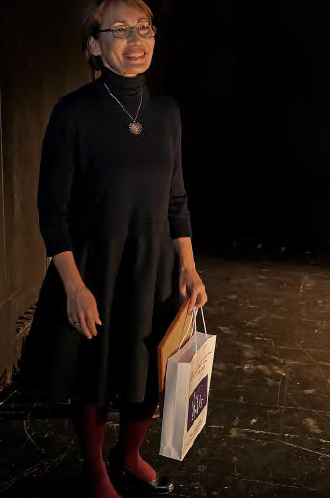
Svetlana Ayupova
We called the performance “based on Hauff’s fairy tale.” Because we kept the whole plot, but I wrote the script myself. There was nothing to modernize — the plot is relevant already, literally enough to cause shivers. Maybe some aspects were “enlarged” and emphasized. And many songs were brought in. Thanks to the authors who are in my head: Joseph Brodsky, Vladimir Vysotsky and other poets who matter to me. When I was writing the script and felt it was time for a song, a certain rhythm popped up from somewhere, which was immediately tested on the stage. And only when I listened to the finished song, I realized its rhythm was Brodsky’s. He says: “We’re led where the Rat-Catcher [the Pied Piper] calls. The catcher calls.” And I say: “Fast asleep, Peter Munch hurts. Peter hurts. Migraines make him toss and turn.”
We read the songs in a recitative manner. The only song heard in the play is a small excerpt from Schubert’s “King of the Forest.” That’s no accident. Because the Dutch-Mike and the Glassmanikin are two forest kings.
There are quotes from Goethe’s Faust — since we know the Faust story was one of the most common themes for German and other European street theaters of Goethe’s time. We decided the story should begin with Peter Munch’s birthday. He turns sixteen years old, and on Sunday he’s setting in a tavern where, in the best traditions of “theater within a theater,” a small puppet show begins. Its main characters are two puppets: God and Mephistopheles, whose dialogue is eternal and is part of the “Cold Heart” storyline. Only instead of Mephistopheles, there are two representatives of the infernal: the Glassmanikin and the Dutch-Mike, who try to divide the immortal soul of a simple coal miner, Peter, between themselves. Another small fragment of Goethe appears in the prologue in heaven, which ends with a quatrain of his.
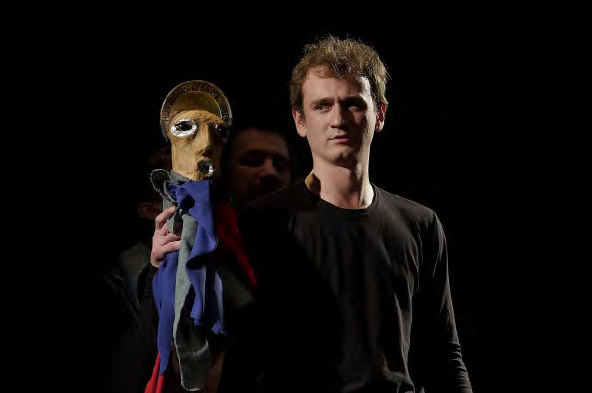
Besides the beloved device of a “theater within a theater,” the performance uses the no less popular method of the way of mystery. (“The concept of mystery — as a sacred act that transforms reality and expands the horizons of the human spirit — is universal in Russian symbolism. It includes not only the mystery of sounds, colors, poetic images, but also the mystery of life itself, as life’s creativity” — that quote from the poet Valery Yakovlevich Bryusov reveals a little about the “way of mystery,” which the art of Russia’s Silver Age embodies — E.M. ).
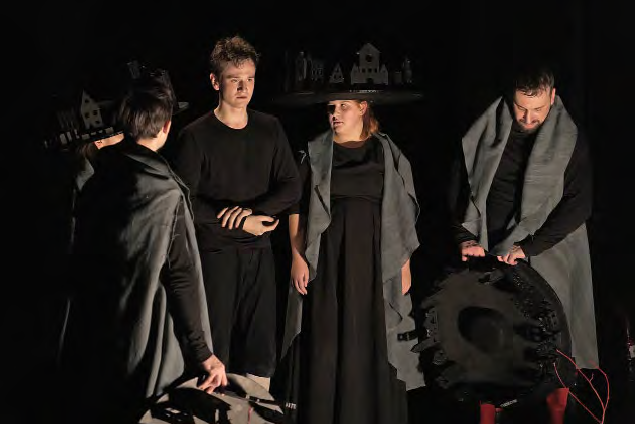
The same principle applies in reading any fairy tale. Children perceive it on one level, adults on another. Fairy tales were really born to embody age-old wisdom, and not as entertainment for children. And of course in German Romanticism, the fairy tales of Hauff or Hoffmann are more serious and deeper than many “adult” books.
Having turned to Hauff, at first I wanted to stage his “Stork Caliph.” But then, when I started working on “The Cold Heart,” I saw how “cinematic” this fairy tale is. Here, unlike in classical theater, the place and time of action changes. As the action progresses, years pass, cities drift by, and the relationships between peoples and places change. And when my wonderful assistant Lisa Semenova and I were thinking about what hats to make for the characters, I asked her to fit entire cities on the hats. She created some absolutely bizarre hats.
As for the cast, of course, there’s the core of our theater, Vladimir Shoshin — the Glassmanikin. We didn’t even consider other candidates for the role. When the play’s development began, it looked completely different. Back then, it included an older group, which a year ago successfully graduated from the eleventh grade and dispersed. I only have a couple of people left from that group. But I still really wanted to do the play, because I wrote the script all summer and finished it in October of last year. Then I got two wonderful actors from the “menYA” Theater Miniatures Workshop — Sergei Kondratiev (the Dutch-Mike), who had already taken part in our studio’s work during our year of developing the play Dzhan. And Evgeny Konnov (Peter Munch), whom it was my first time to rehearse with. Thanks to “MenYA” head Ekaterina Vyacheslavovna Temnova, who literally assigned these guys to me. They do selfless work, try very hard, in the spirit of our theater. Lisbeth is played in turn by Guzel Sakaeva and Liana Timurshina. They are sensitive, literally crystalline girls, like real Lisbeths. In the fairy tale, Lisbeth and the mother aren’t described in much detail. So their images needed to be elaborated. Our mother has a more developed story. She is the keeper of the Secret. When we read the fairy tale, which we did for a long time, using the slow reading technique (thanks to Galina Yakovlevna Verbitskaya, who taught it to us), we had a huge number of questions. Many of them concerned the image of Peter’s mother. For example: what is her relationship with the Glassmanikin? Why didn’t she reveal the lullaby’s words to Peter? Why is it mentioned that Peter was born on a Sunday with bells ringing? For us, all this evoked very obvious references and associations. At the end, the Dutch-Mike says: “One fine day when you die, boy, your heart will come back to you again.” Or when Peter runs to the Glassmanikin, after getting his heart back, and asks him to kill him as his last, third wish. The Glassmanikin agrees and leaves. At that moment, Peter looks back and sees his mother and Lisbeth. How should this be understood? Is he alive at that moment? Or is the encounter already taking place in another reality?
We decided that Peter Munch would be an inherited name. Doesn’t everyone know that Hamlet’s father’s name was Hamlet? Knowing that Peter’s father and grandfather were coal miners and had the same name, we decided that it would be logical if at the end, when the son is born, he would also be Peter Munch. But he’s born a little Glassmanikin.
Our puppet, of course, isn’t made according to any canons — it’s a double-sided shapeshifter. On one side he has God with a halo on which is written: “Johann Goethe invented me, and him too.” And on the other side, and so in a different garment, is Mephistopheles.
The mother is played by Ira Okisheva. Ira plays the mother amazingly. And they all play roles as squirrels. Since it’s a theater in a theater, everyone is everyone. When she puts on a headscarf, she’s the mother. Or when the bride puts on a veil, she’s Lisbeth. But really, they’re all trees, and the Glassmanikin’s squirrels, and the Dutch-Mike’s infernal team.
We came up with another beautiful image with the red forest. It’s a huge pile of bottles with small red hearts inside, with red trees sprouting out of them like veins and arteries. They’re the Dutch-Mike’s jars. The question arises: where did the Dutch-Mike get so many jars? From the Glassmanikin? When did the dispute between these two “forest kings” begin? And when will it end? If it ends…
There are many moments when we understand that the Dutch-Mike is kinder, simpler and easier to get along with. He has no agendas. Our leitmotif is the phrase “because they are people.” And that justifies everything. Our Dutch-Mike is no monster, he doesn’t kill anyone, he simply carefully preserves people’s hearts in jars and provides the cruel-hearted rulers of this world with money and benefits. But the Glassmanikin is demanding, although ironic.
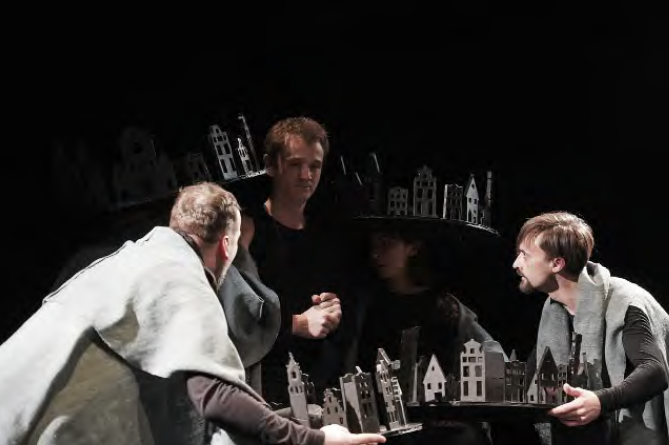
I’d like to say thank you to everyone who helped stage this play: for your kind words, for the space. To Lisa for making some amazing hats. Thank you guys for your dedication, because by hook or by crook, despite illness, lack of time and “I can’t,” they pull together a very complex story. It was born as an alternative. When the guys asked me to do a performance for them, they suggested Dostoevsky’s Demons or Bulgakov’s The Master and Margarita. But I offered them “The Cold Heart” because it has everything. And also thanks to Yuri Vasilyevich Zaits, who gave us a huge piece of fabric from which we sewed our raincoats. The theater lets us use its site for a very decent rent. And thanks to Tom Waits! In all, my soundtrack has 56 songs that somehow needed mixing.
II
In December, the traditional festival of independent theaters and theatrical projects “Christmas Parade” was held in St. Petersburg. For several years in a row, the Ufa-based studio theater “Alter Ego,” directed by Svetlana Ayupova, has taken part in the festival. This year, the group presented a play based on Wilhelm Hauff’s fairy tale “The Cold Heart,” for which Svetlana Rifovna wrote the script herself.
“Alter Ego” productions never leave the audience unmoved, because the themes they raise are always relevant and the actors’ characters are so convincing that the viewer involuntarily gets drawn into the action and becomes a partner in what happens on stage. The play “The Cold Heart” was no exception.
Right from the start, after coming to the auditorium as an outside observer, you gradually begin to feel like a dweller in a Black Forest town, where many successful, respected people live, but which also has a lot of grief and despair. And a coal miner’s young son lives there. You’ve seen him many times, but you don’t remember his name. And who’d remember every poor man’s name?..
Then the story of this young man named Peter Munch (Evgeny Konnov) unfolds before us. The young man is trying his best to get his name remembered. And that, he believes, takes becoming rich and noble. From his mother, Peter learns that he was born on a Sunday, and that such people receive help from the Glassmanikin, a creature living in the nearby forest. Peter goes into the forest. That’s the first step to him “getting out of the coal pit” and changing his life.
Peter’s meeting with the Glassmanikin (Vladimir Shoshin) is the quintessence of the entire performance. The Glassmanikin, unlike his colleague in causing evil — the Dutch-Mike — is not an absolute villain. Rather, he’s a kind of “reflective intellectual” who speaks about human nature. He doesn’t gloat, but instead regrets how people try to live someone else’s life, and how instead of intelligence they ask for wealth and power. His dialogue with Peter keeps the viewer at the height of tension. With all his youthful passion and maximalism, Peter tries to convince the imp that he, a coal miner’s son, merits help from the forest wizard. The Glassmanikin speaks in a quiet, soulful voice. He has heard such speeches many times, and he’s tired of them. He keeps trying to convey to Peter the idea that he himself must build his own destiny, he himself must work so that people remember his name. But Peter doesn’t hear him… When the wizard demands from the young man that he himself, without prompting from others, remember the words of the lullaby-spell, he irritably answers: “I don’t write poetry.” “That’s a pity,” the Glassmanikin says quietly. And this “pity” is a kind of universal regret about the missed opportunities of a huge number of people. (After the performance, the author of those lines recalled that Viktor Tsoi [(1962-1990), songwriter and lead singer of the band Kino] worked in a boiler room, also “sat in a coal pit,” but at the same time wrote his wonderful songs, thanks to which his name will be remembered and repeated by more than one generation.)
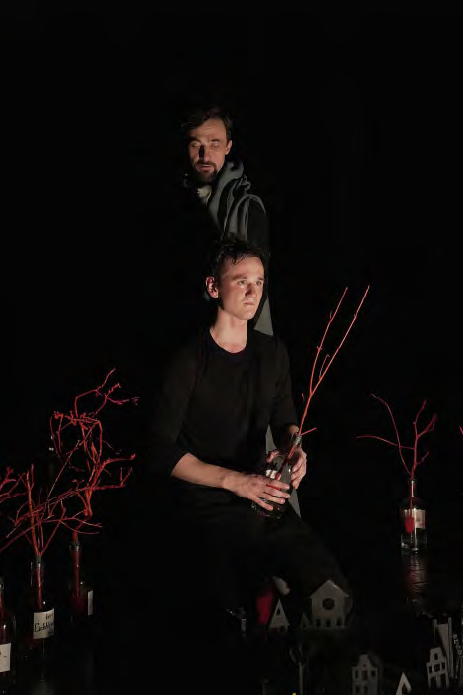
Predictably, the wealth Peter receives for nothing quickly goes down the drain. And so our hero goes into the forest again. He doesn’t blame himself for his failure, but blames the same Glassmanikin whom he asked for help not so long ago. The imp invites the young man to resort to more radical means and sends him to the master of the forest, the Dutch-Mike.
The Dutch-Mike (Sergei Kondratiev) is the opposite of the Glassmanikin. Although they are both villains, The Dutch-Mike is a simple and clear villain. There is no reflectiveness in him; he talks with cynical satisfaction about how he’s hurt people, profiting from selling rotten timber that’s later caused ships to sink. The Dutch-Mike takes people’s hearts (their souls) in exchange for money and position in society. Like a scammer, he repeats the same speech to everyone who comes to him: “Well, why do you need a heart? If people insult you, it hurts. Besides, you won’t feel any pain or sadness” (as well as joy, love, remorse — but that remains behind the scenes). When Peter looks at the collection of hearts in glass vessels, he’s overcome with amazement: it turns out that half of all the people in the Black Forest have exchanged their hearts for earthly goods. And the audience is also filled with amazement and horror — how many heartless people there are in this town! But then another thought might occur to you (according to the principle “is the glass half full or half empty”): but there’s also the other half who didn’t succumb to temptation. And that can give hope.
Yet Peter isn’t put off by the discovery, and he makes a deal with the forces of evil. The entire subsequent life of the coal miner’s son brings him no joy. Yes, he gets rich, becomes influential and respected, but at what cost? Friendships and neighborly ties are broken, people suffer and die. Peter commits the most terrible crimes: he drives his mother (Irina Okisheva) out of the house and kills his wife Lisbeth (Guzel Sakaeva). Nothing makes him happy, since he no longer has a heart. But over the years, our hero begins to understand the abnormality of his situation. Where the heart is lacking, the mind can come to the rescue. Peter is burdened by his life, his wealth, his loneliness.
He goes into the forest again. Just like many years ago, he finds the Glassmanikin and again asks him for help. But now the forest wizard replies loudly and imperiously to his request to give his heart back: “Do it yourself! You have to do it yourself!” And Peter goes (no, runs) to the Dutch-Mike. He manages to outwit the villain and retrieve his heart. But having gotten his heart back and become a real person again, Peter realizes the severity of his sins, truly feels how much harm he has done to people. And he understands that he can no longer live with such a burden. He asks the Glassmanikin to kill him to save him from all this. And the imp agrees. But it is not he who kills Peter, but the Dutch-Mike, for whom killing is commonplace. And yet humanity and goodness win. Thanks to his act of courage, Peter finally gets what he’s been striving for: people remember and pronounce his name with respect. Only the price for this is the highest, his life.
Interestingly, the play’s last word comes from the Glassmanikin. Trying to explain to himself and others all that has happened, he pensively says: “Because they are people.”
This wonderful, deeply meaningful story was presented to the audience by five actors from the “Alter Ego” theatrical studio. Vladimir Shoshin (the Glassmanikin) and Sergey Kondratiev (the Dutch-Mike) are already experienced studio members, whose professionalism served as a good support for younger and novice colleagues. And the newcomers played their roles well. It was impossible not to note the dedication with which Evgeny Konnov (Peter Munch), Guzel Sakaeva (Lisbeth) and Irina Okisheva (the mother) played. And while the difficulty of the role of Evgeny lay in him having to play his hero at different ages, Guzel and Irina had their own challenges — in addition to their main roles, they constantly had to transform into other characters.
Of course, high professionalism comes with age and experience, and every actor has room to grow and develop.
I’d also like to note the work of set designer Elizaveta Semyonova, whose wonderful city-topped hats helped to transport the audience, along with the characters, to different places and to create a special aura on the stage.
We wish the theater further interesting productions and grateful audiences, and look forward to new meetings with this wonderful team.
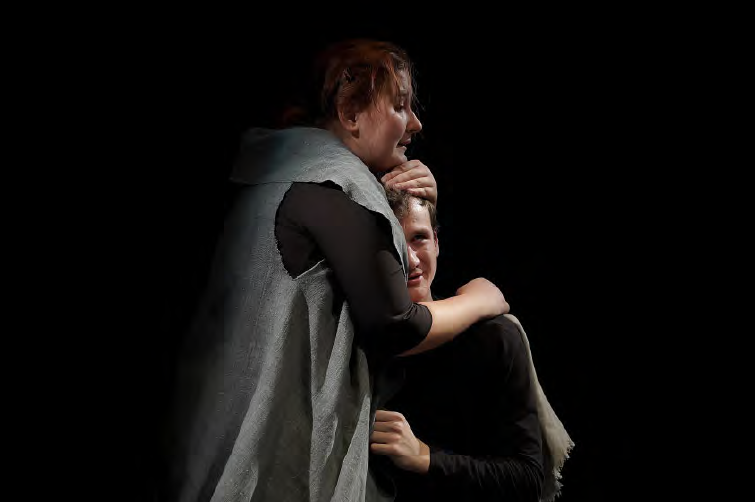
Photos by Tatyana Lunko

Another example of the way Apraksin Blues expands our experiences. Thank you!